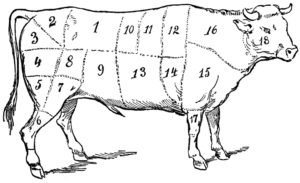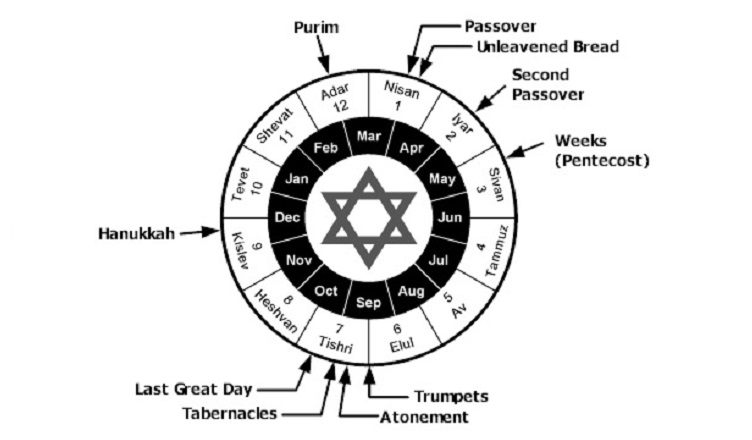From Leviticus 22-23

This chapter describes a number of festivals to the LORD. The Sabbath (Lev 23.3), the Passover (Lev 23.4-8), the Feast of Firstfruits (Lev 23.9-14), the Feast of Weeks (Lev 23.15-22), the Feast of Trumpets (Lev 23.23-25), the Day of Atonement (Lev 23.26-32), and the Feast of Booths (Lev 23.33-43). What special times in the year do we rest and remember what Christ has done for us?
This post is part of my bible in a year series.
Passage and Comments
Two main ideas come together in this chapter. Sacred time and God’s provision through agriculture.
Sacred time – There are holy places (the tabernacle and temple), holy people (priests) and holy periods of time. These are times when Israel stopped their normal lives and devoted themselves to remembering what God had done for them and worshipping him.
God’s provision – These feasts also designated various times throughout the agricultural year when God was praised for his goodness and his blessing sought for the future.
23 The LORD spoke to Moses, saying, 2 “Speak to the people of Israel and say to them, These are the appointed feasts of the LORD that you shall proclaim as holy convocations; they are my appointed feasts. (Lev 23.1-2)
‘Appointed feasts’, ‘Holy convocations’. The LORD introduces this chapter alluding to the main ideas of time, celebration and holiness.
3 “Six days shall work be done, but on the seventh day is a Sabbath of solemn rest, a holy convocation. You shall do no work. It is a Sabbath to the LORD in all your dwelling places. (Lev 23.3)
‘Sabbath of solemn rest’. God rested on the day following his work of creation. The Sabbath calls Israel to remember God and his work of creation through their own rest. Ceasing from work, thus making this a time of holiness for the LORD.
4 “These are the appointed feasts of the LORD, the holy convocations, which you shall proclaim at the time appointed for them. 5 In the first month, on the fourteenth day of the month at twilight, is the LORD’s Passover. 6 And on the fifteenth day of the same month is the Feast of Unleavened Bread to the LORD; for seven days you shall eat unleavened bread. 7 On the first day you shall have a holy convocation; you shall not do any ordinary work. 8 But you shall present a food offering to the LORD for seven days. On the seventh day is a holy convocation; you shall not do any ordinary work.” (Lev 23.4-8)
‘Passover’, ‘Feast of Unleavened Bread’. These were two separate feasts merged together. One followed immediately after the other. These feasts recalled and celebrated the exodus from Egypt and arched back to Israel’s birth as a nation. God’s firstborn son (Ex 4.22).
9 And the LORD spoke to Moses, saying, 10 “Speak to the people of Israel and say to them, When you come into the land that I give you and reap its harvest, you shall bring the sheaf of the firstfruits of your harvest to the priest, 11 and he shall wave the sheaf before the LORD, so that you may be accepted. On the day after the Sabbath the priest shall wave it. 12 And on the day when you wave the sheaf, you shall offer a male lamb a year old without blemish as a burnt offering to the LORD. 13 And the grain offering with it shall be two tenths of an ephah of fine flour mixed with oil, a food offering to the LORD with a pleasing aroma, and the drink offering with it shall be of wine, a fourth of a hin. 14 And you shall eat neither bread nor grain parched or fresh until this same day, until you have brought the offering of your God: it is a statute forever throughout your generations in all your dwellings. (Lev 23.9-14)
‘Firstfruits of your harvest’, ‘Sheaf’. The next two festivals described in verses 9-21 concern two festivals, fifty days apart, that celebrate and thank God for the beginnings of the barley and wheat harvests.
‘When you come into the land’. These of course can only be celebrated after they are settled in the Promised Land.
We don’t have space to comment on the remaining feasts. The chapter fittingly ends with.
44 Thus Moses declared to the people of Israel the appointed feasts of the LORD. (Lev 23.44)
Story of Israel

The festivals were significant events in the yearly calendar of Israel as the people worshipped God because of his redemptive acts in history and his goodness and provision to them in their agriculture. They also pointed forward to more significant events ahead what they would be restructured around Christ and his saving works.
Story of Jesus
The Christian year takes its basic shape from the ancient feasts of Israel.
Jesus was crucified at the time of Passover, and Paul uses both that and the associated Feast of Unleavened Bread in 1 Cor. 5:7–8. Holy Week then climaxes on Easter Day, and Paul associates the resurrection of Christ with the firstfruits in 1 Cor. 15:20–23. It was on the day of Pentecost (the Feast of Weeks) that the Holy Spirit came in power on the disciples (Acts 2:1), and this is celebrated on Whitsunday.
Thus far, it can be seen that the Christian faith follows the OT in linking its primary festivals, not merely with the cycle of the seasons, but with unique historical events.
The historical dimension of the Feast of Tabernacles, however, has not been preserved in Christian harvest festivals. In any case, they are soon overshadowed by the additional festival of Christmas celebrating the historical birth of Christ. (Wright, C.J.H., 1994. Leviticus. In D. A. Carson et al., eds. New Bible commentary: 21st century edition. Leicester, England; Downers Grove, IL: Inter-Varsity Press, pp. 151–152.)
The blessings of these Sabbaths are made for the benefit of human beings.
27 And he said to them, “The Sabbath was made for man, not man for the Sabbath. 28 So the Son of Man is lord even of the Sabbath.” (Mk 2.27-28)
Copyright © Joshua Washington and thescripturesays, 2015-17. All Rights Reserved.

